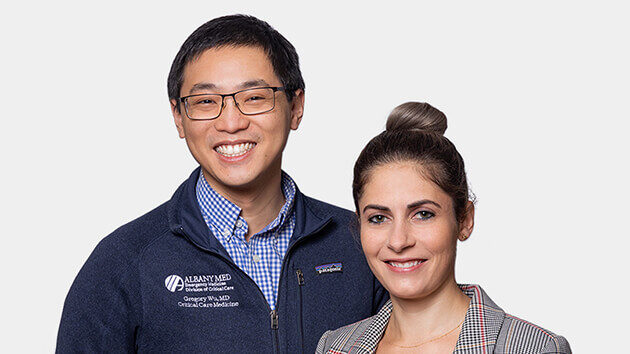Physicians Reflect on Creation, Success of Treatment Program for Covid-19 Patients

When Drs. Marissa Potenza and Gregory Wu took on the responsibility of managing a program providing a new treatment to help Covid-19 patients, there was plenty to do before their first patient ever walked through the door.
It was in November 2020 when the two physicians started their work on the creation and management of the monoclonal antibody treatment program at Albany Medical Center. Monoclonal antibodies support the immune system and can block the virus that causes Covid-19 from attaching to human cells.
Dr. Potenza, an emergency physician, and Dr. Wu, an emergency physician who also works as an intensivist in the intensive care unit, started at the ground floor. They created guidelines for the program as well as the model for Albany Medical Center physicians to use when referring patients. It was a challenging task with varying responsibilities—working with the pharmacy team to secure orders of medications; setting up staffing and nursing schedules for administering the medications and ensuring proper training; securing a location within Albany Medical Center for treatments; and much more.
Within a matter of weeks, the program was up and running. The two physicians would often work seven days a week. That included time spent making calls to patients nights and weekends to discuss whether treatments were available or would be effective.
“When you get into the weeds of the program, it can seem daunting,” Dr. Potenza said. “It can feel like it’s never going to end. But then you hear from a patient or a friend of a friend and you learn that a patient is doing better and that makes the work worthwhile.” As the program grew, Drs. Potenza and Wu continued to carry out their day-to-day responsibilities in the Emergency Department and ICU and could see the impacts of Covid-19 on patients.
“Even when we were talking about Covid receding, we were still seeing what was going on at an ICU level,” Dr. Wu said. “This never completely went away. Things still haven’t. This is an ongoing struggle for a lot of folks.”
The two say they are grateful for the support they’ve received from the Albany Medical Center community as well as throughout the Albany Med Health System. Through the program at Albany Medical Center, over 2,200 adult and pediatric patients have been screened for potential treatment, with close to a thousand treatments administered. The numbers are impressive, even before factoring in the impact they’ve had in helping to reduce the number of Covid-19 hospitalizations.
“We were looking at our own data such as our rates of people being admitted to the hospital after this treatment,” Dr. Wu said. “Those rates were remarkably low. I think it was very reflective of how the treatment helped.”
Research continues at a national level to measure the efficacy of monoclonal antibody treatments. Varying studies have documented their success—one study showed a significant reduction of Covid-related hospitalizations and death of more than 70 percent in patients.
Part of the program’s success at Albany Medical Center has been the adaptability of all those involved. That rapid response included acting quickly as Covid-19 variants surfaced as well as pushing through the toughest of times when there were nationwide shortages of the medications used in these treatments.
“Dr. Potenza and Dr. Wu have tirelessly run this program that has saved lives and reduced the number of hospitalizations related to Covid-19,” said Daniel Pauze, MD, ’04, chief medical officer. “They’ve done so with the respect and care of patients at the forefront, all while continuing their everyday duties as emergency and ICU physicians.”
As Covid cases continued to decline in the region in March 2022, Drs. Potenza and Wu began to return to a more normal schedule, seeing their work with the program slow a bit. At the same time, they are able to reflect back on the significance of the program and the work they’ve done.
“At the end of the day, these patients were worried,” Dr. Potenza said. “They were sick and looking at this treatment, for better or worse, as something that’s going to help them. It’s been an eye-opening experience.”
